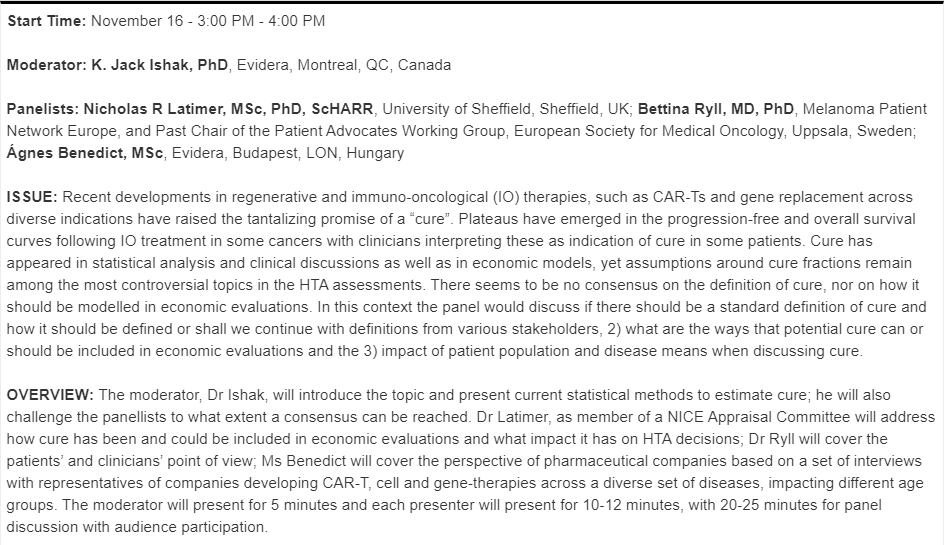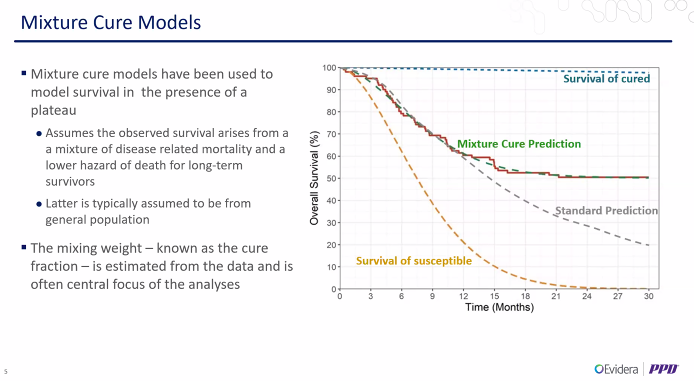
Fellow #ISPORians I'll be logging in to the #WomenInHEOR #ISPOREurope session Adapting to the ‘New Normal’ 😀
W/ @juliaslejko, Olivia Wu, @DrBlytheAdamson, @nancydevlin1, Ebere Onukwugha and @LouiseTimlin - a panel of #HEOR stars 🤩
W/ @juliaslejko, Olivia Wu, @DrBlytheAdamson, @nancydevlin1, Ebere Onukwugha and @LouiseTimlin - a panel of #HEOR stars 🤩

To start, @juliaslejko presents the context for the @ISPORorg #WomenInHEOR initiative.
There is evidence that diversity pays off in terms of companies' profitability. But women are under-represented, and there is a leaky pipeline in academia
#ISPOREurope
There is evidence that diversity pays off in terms of companies' profitability. But women are under-represented, and there is a leaky pipeline in academia
#ISPOREurope

@ISPORorg board members and staff are quite diverse. What about ISPOR conferences, like #ISPOREurope?
Gender diversity has improved in ISPOR conferences 👏
But there is still some way to go - that's ISPOR intention and aspiration


Gender diversity has improved in ISPOR conferences 👏
But there is still some way to go - that's ISPOR intention and aspiration



Next up in #ISPOREurope, #WomenInHEOR panel on adapting to the new normal. 79 attendees on the zoom count 🎉 

Olivia Wu starts with the background to this session. We have had to change how we work and live. In this new normal, how can we manage this situation and continue to advance how career?
Today's panel will share their strategies
#ISPOREurope
Today's panel will share their strategies
#ISPOREurope
We start with a poll about how the "new normal" has impacted our ability to work. A minority of us was negatively impacted, and around 1/3 have some concerns about meeting work goals.
#ISPOREurope
#ISPOREurope
@LouiseTimlin discusses the implications of #COVID19 and gender roles. She starts by acknowledging that, although we are all in the same seas, we actually have different boats, and tells us about her personal situation.
#ISPOREurope
#ISPOREurope
Louise has became aware that we are falling back into traditional gender roles, irrespective of whether women are in paid work. Recent data from the UK, for example, supports this. At the same time, more mothers are reporting high anxiety than fathers
#ISPOREurope
#ISPOREurope
Why does it matter? Because women are more likely to lose their jobs. Once women are out of workforce, it is harder to get back than for men. And gender pay gap will get bigger.
#ISPOREurope
#ISPOREurope

So we need to take active steps to keep women in the workforce. In the home, we should try to achieve gender balance in the chores. At work, by supporting employees in flexible working, being role models, checking on those we line manage.
#ISPOREurope
#ISPOREurope
Next up in #ISPOREurope, Ebere Onukwugha. She starts by noting that, nothing's wrong, but something's not right.
E.g. higher education institutions have reduced their staff at the fastest rate since 2000 at 10% of the workforce.
E.g. higher education institutions have reduced their staff at the fastest rate since 2000 at 10% of the workforce.

We should recognise that disruption creates opportunity, by learning and planning. E.g. plan for interruptions, acknowledge that some processes may take longer, keep an eye out for new collaborations.
#ISPOREurope
#ISPOREurope
What worked before #COVID19 still works, but differently. Structure, managing expectations, setting goals and celebrating milestones worked before, and works now too.
#ISPOREurope
#ISPOREurope
In sum, if it ain't broke, don't fix it; disruption creates opportunity; and your work matters and you matter
#ISPOREurope
#ISPOREurope
Next up, @DrBlytheAdamson, with a perspective of someone who works for a tech company, on "Setting a Pace for Endurance" at #WomenInHEOR #ISPOREurope
Blythe highlights that, #WomenInHEOR, we have the strongest skill set to endure this pandemic.
Remove schooling and remote working is a big challenge, but our skills help us understand perspective and time horizon.
#ISPOREurope
Remove schooling and remote working is a big challenge, but our skills help us understand perspective and time horizon.
#ISPOREurope
When we make decisions about our lives and productivity, often we a stated WTP and a revealed WTP, which reveals what we value. So we can reflect on what we want for ourselves and our families, which then informs our personal decisions
#ISPOREurope
#ISPOREurope
Next up, @nancydevlin1 at #ISPOREurope #WomenInHEOR.
The shift to virtual working has had a positive effect - equalised access to conferences for those for whom long distance travel is difficult. But! engagement & interaction comes at a price, with working at night & overwork
The shift to virtual working has had a positive effect - equalised access to conferences for those for whom long distance travel is difficult. But! engagement & interaction comes at a price, with working at night & overwork

Nancy notes that it was very difficult to achieve work-life balance when quarantining/self-isolating. So learning to say no is important!
Important for Nancy to ensure that we go into a gender bias situation in the long term.
#ISPOREurope
Important for Nancy to ensure that we go into a gender bias situation in the long term.
#ISPOREurope
The lockdown has had different impacts depending on their personal situation. Important to set boundaries, to balance work and other commitments. Noting that teaching online has taken a lot of effort, and lockdown has had a big impact on research
#ISPOREurope
#ISPOREurope

Nancy has started to think about how institutions should adapt, to change their rules to reflect different opportunities and challenges facing women, promotion opportunities need to be adapted, and there should be flexibility in goals
#ISPOREurope
#ISPOREurope
Issues & opportunities:
In transitioning from online only to hybrid team meetings, managing safe & effective return to work, counteract the impact of the financial context, learning what worked well, and ensure that new opportunities & silver linings are retained
#ISPOREurope
In transitioning from online only to hybrid team meetings, managing safe & effective return to work, counteract the impact of the financial context, learning what worked well, and ensure that new opportunities & silver linings are retained
#ISPOREurope
And if you'd like to read about @nancydevlin1's experience of quarantining, have a look at mdhs.unimelb.edu.au/news-and-event…
#ISPOREurope
#ISPOREurope
Q&A session😀
Q by Olivia: Any top tips on how to meet new people & establish collaborations?
A: It's difficult, but an idea is to carve out time by scheduling a coffee zoom with a colleague.
#ISPOREurope
Q by Olivia: Any top tips on how to meet new people & establish collaborations?
A: It's difficult, but an idea is to carve out time by scheduling a coffee zoom with a colleague.
#ISPOREurope

A: One paradox of working from home, meetings are more efficient. If that has happened to you, don't be afraid to reach out to people, as it may have happened to others too
#ISPOREurope
#ISPOREurope
Q: Top tips on how to turn off when working from home
A: The motivation is that you are more productive if you are away from work. Another idea is to support local businesses that are covid safe and need our custom. Learn to say no and be strategic.
#ISPOREurope
A: The motivation is that you are more productive if you are away from work. Another idea is to support local businesses that are covid safe and need our custom. Learn to say no and be strategic.
#ISPOREurope
Q: Will the pandemic put women in less advantageous position than before?
A: There's potential for that to happen, but the challenge for us as #WomenInHEOR is to find ways to disseminate what we've done/are doing.
#ISPOREurope
A: There's potential for that to happen, but the challenge for us as #WomenInHEOR is to find ways to disseminate what we've done/are doing.
#ISPOREurope
Q: What should we be doing to encourage our institutions to support us?
A: Difficult as changing rules is hard. We need to be vigilant to ensure that disadvantage is recognised, be aware off unconscious biases, reach out to colleagues, be collegiate
#ISPOREurope
A: Difficult as changing rules is hard. We need to be vigilant to ensure that disadvantage is recognised, be aware off unconscious biases, reach out to colleagues, be collegiate
#ISPOREurope
Thanks to all panellists for an insightful discussion and sharing their experiences. Well done #WomenInHEOR #ISPOREurope 👏😀
• • •
Missing some Tweet in this thread? You can try to
force a refresh












